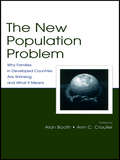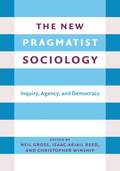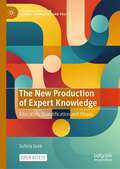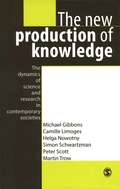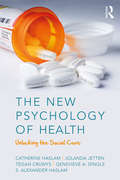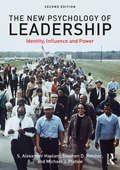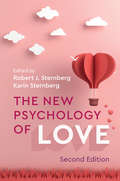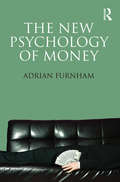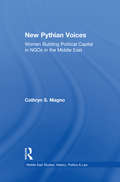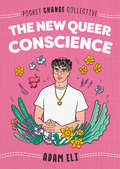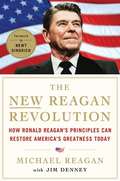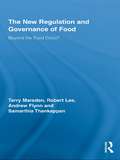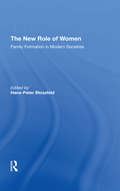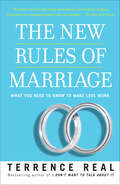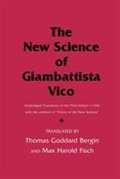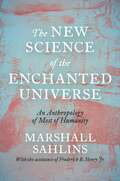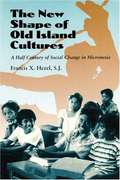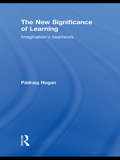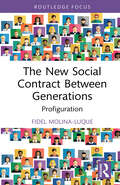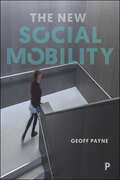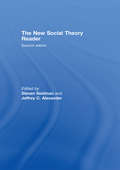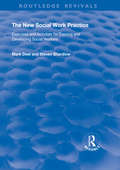- Table View
- List View
The New Population Problem: Why Families in Developed Countries Are Shrinking and What It Means (Penn State University Family Issues Symposia Series)
by Alan Booth Ann C. CrouterThis book is based on the presentations and discussions from a national symposium on "Creating the Next Generation: Social, Economic, and Psychological Processes Underlying Fertility in Developed Countries," held at the Pennsylvania State University in 2003. The papers address some of the antecedents and consequences of the recent steep declines in fertility in developed countries from different theoretical and disciplinary angles. While fertility rates are still high in some less-developed parts of the world, the new population problem with many countries in Europe, Asia, and North America is declining fertility. With fertility decline comes a reshaping of the population pyramid. The topic of fertility decline is interesting not only at the level of the individuals and couples, but also at the level of the societies that must come to grips with their long-term implications.Divided into four Parts, the text:*looks at contemporary trends in U.S. fertility, thus setting the stage for the entire volume;*discusses social and cultural values and attitudes;*analyzes fertility decisions in different countries; and*focuses on the possible long-term consequences of current fertility trends for individuals, families, and societies.
The New Pragmatist Sociology: Inquiry, Agency, and Democracy
by John Levi Martin Ann Mische Stefan Timmermans Iddo Tavory Paul Lichterman Jeffrey Parker Daniel Silver Mario Small Daniel Huebner Luis Flores Josh Whitford Mazen Elfakhani Cayce Hughes Vontrese Pamphile Natalie B. Aviles Susan Silbey Karida Brown Luna Vincent Daniel CefaiPragmatist thought is central to sociology. However, sociologists typically encounter pragmatism indirectly, as a philosophy of science or as an influence on canonical social scientists, rather than as a vital source of theory, research questions, and methodological reflection in sociology today.In The New Pragmatist Sociology, Neil Gross, Isaac Ariail Reed, and Christopher Winship assemble a range of sociologists to address essential ideas in the field and their historical and theoretical connection to classical pragmatism. The book examines questions of methodology, social interaction, and politics across the broad themes of inquiry, agency, and democracy. Essays engage widely and deeply with topics that motivate both pragmatist philosophy and sociology, including rationality, speech, truth, expertise, and methodological pluralism.Contributors include Natalie Aviles, Karida Brown, Daniel Cefaï, Mazen Elfakhani, Luis Flores, Daniel Huebner, Cayce C. Hughes, Paul Lichterman, John Levi Martin, Ann Mische, Vontrese D. Pamphile, Jeffrey N. Parker, Susan Sibley, Daniel Silver, Mario Small, Iddo Tavory, Stefan Timmermans, Luna White, and Joshua Whitford.
The New Production of Expert Knowledge: Education, Quantification and Utopia (Palgrave Studies in Science, Knowledge and Policy)
by Sotiria GrekThis Open Access book offers a novel perspective on the role of quantification in the making of education utopias through an analysis of expert knowledge and its producers. Drawing on empirical findings from the European Research Council funded project ‘International Organisations and the Rise of a Global Metrological Field’ (METRO, 2017-2022), Education, Quantification and Utopia focuses on the ways that metrological realism has constructed a well-supported epistemic infrastructure, built on relationships and practices that go beyond the mere objectivity and reliability of numerical evidence. The book’s chapters outline how the production of new forms of education expertise have led to ideational and institutional interdependencies, and ultimately the making of an intricate, fragmented and opaque knowledge and governance web.
The New Production of Knowledge: The Dynamics of Science and Research in Contemporary Societies
by Helga Nowotny Peter Scott Simon Schwartzman Martin Trow Michael Gibbons Camille LimogesIn this provocative and broad-ranging work, the authors argue that the ways in which knowledge - scientific, social and cultural - is produced are undergoing fundamental changes at the end of the twentieth century. They claim that these changes mark a distinct shift into a new mode of knowledge production which is replacing or reforming established institutions, disciplines, practices and policies. Identifying features of the new mode of knowledge production - reflexivity, transdisciplinarity, heterogeneity - the authors show how these features connect with the changing role of knowledge in social relations. While the knowledge produced by research and development in science and technology is accorded central concern, the authors also outline the changing dimensions of social scientific and humanities knowledge and the relations between the production of knowledge and its dissemination through education.
The New Psychology of Health: Unlocking the Social Cure
by Jolanda Jetten Alex Haslam Catherine Haslam Tegan Cruwys Genevieve DingleWhy do people who are more socially connected live longer and have better health than those who are socially isolated? Why are social ties at least as good for your health as not smoking, having a good diet, and taking regular exercise? Why is treatment more effective when there is an alliance between therapist and client? Until now, researchers and practitioners have lacked a strong theoretical foundation for answering such questions. This ground-breaking book fills this gap by showing how social identity processes are key to understanding and effectively managing a broad range of health-related problems. Integrating a wealth of evidence that the authors and colleagues around the world have built up over the last decade, The New Psychology of Health provides a powerful framework for reconceptualising the psychological dimensions of a range of conditions – including stress, trauma, ageing, depression, addiction, eating behaviour, brain injury, and pain. Alongside reviews of current approaches to these various issues, each chapter provides an in-depth analysis of the ways in which theory and practice can be enriched by attention to social identity processes. Here the authors show not only how an array of social and structural factors shape health outcomes through their impact on group life, but also how this analysis can be harnessed to promote the delivery of ‘social cures’ in a range of fields. This is a must-have volume for service providers, practitioners, students, and researchers working in a wide range of disciplines and fields, and will also be essential reading for anyone whose goal it is to improve the health and well-being of people and communities in their care.
The New Psychology of Leadership: Identity, Influence and Power
by S. Alexander Haslam Michael J. Platow Stephen D. ReicherThis ground-breaking book provides a refreshing introduction to the field of leadership and is jam-packed with theoretical and practical insights derived from a wealth of applied scientific research conducted by the authors and their colleagues around the world over the last three decades. It starts from the premise that leadership is never just about leaders. Instead it is about leaders and followers who are joined together as members of a social group that provides them with a sense of shared social identity — a sense of ‘us-ness’. In these terms, leadership is understood as the process through which leaders work with followers to create, represent, advance, and embed this sense of shared social identity. The new edition of this award-winning book presents a wealth of evidence from historical, organizational, political and sporting contexts to provide an expanded exploration of these processes of identity leadership in action. In particular, it builds upon the success of the first edition by examining the operation of identity leadership in contemporary society and fleshing out practical answers to key organizational and institutional challenges. Drawing on real-world examples and rich data sources, this book will appeal to academics, researchers and students of psychology, business and management, as well as to practitioners, policy makers and anyone interested in the workings of leadership, influence and power.
The New Psychology of Love
by Robert J. Sternberg Karin SternbergThis is a much-needed development from the first edition that provides an update on the theory and research on love by world-renowned scientific experts. It explores love from a diverse range of standpoints: social-psychological, evolutionary, neuropsychological, clinical, cultural, and even political. It considers questions such as: how men and women differ in their love, what makes us susceptible to jealousy and envy in relationships, how love differs across various cultures? As the neuropsychological basis of love is examined, this study showcases what attracts people to one another, why love has developed the way it has over time, and what evolutionary purpose it serves. It also analyses why and when love relationships both succeed and fail, which means readers will be rewarded with a better understanding of their own relationships and those of others, as well as what can be done to build a lasting, loving relationship.
The New Psychology of Money
by Adrian FurnhamThe New Psychology of Money is an accessible and engrossing analysis of our psychological relationship to money in all its forms. Comprehensive and insightful, Adrian Furnham explores the role that money plays in a range of contexts, from the family to the high street, and asks whether the relationship is always a healthy one. Discussing how money influences what we think, what we say, and how we behave in a range of situations, the book places the dynamics of high finance and credit card culture in context with traditional attitudes towards wealth across a range of cultures, as well as how the concept of money has developed historically. The book is split into four sections: Understanding Money. What are our attitudes to money, and how does nationality, history and religion mediate those attitudes? Money in the Home How do we grow up with money, and what role does it play within the family? What role does gender play, and can we lose control in dealing with money? Money at Work. Are we really motivated by money at work? And what methods do retailers use to persuade us to part with our money? Money in Everyday Life. How do we balance the need to create more money for ourselves through investments with the desire to make charitable contributions, or give money to friends and family? How has the e-revolution changed our relationship to money? Radically updated from its original publication in 1998, The New Psychology of Money is a timely and fascinating book on the psychological impact of an aspect of daily life we generally take for granted. It will be of interest to all students of psychology, economics and business and management, but also anyone who takes an interest in the world around them.
The New Pythian Voices: Women Building Capital in NGO's in the Middle East
by Cathryn MagnoFirst published in 2002. Routledge is an imprint of Taylor & Francis, an informa company.
The New Queer Conscience (Pocket Change Collective)
by Adam EliIn The New Queer Conscience, LGBTQIA+ activist Adam Eli argues the urgent need for queer responsibility -- that queers anywhere are responsible for queers everywhere. <p><p> Pocket Change Collective is a series of small books with big ideas from today's leading activists and artists. In this installment, The New Queer Conscience, Voices4 Founder and LGBTQIA+ activist Adam Eli offers a candid and compassionate introduction to queer responsibility. Eli calls on his Jewish faith to underline how kindness and support within the queer community can lead to a stronger global consciousness. More importantly, he reassures us that we're not alone. In fact, we never were. Because if you mess with one queer, you mess with us all.
The New Reagan Revolution: How Ronald Reagan's Principles Can Restore America's Greatness
by Newt Gingrich Jim Denney Michael ReaganThe challenges and threats we as a nation face today are eerily similar to the conditions in the world before the beginning of the Reagan era. In his famous 1976 speech at the Republican National Convention, Ronald Reagan helped define a way forward and strengthened the Republican Party. As we stand at a crossroad once again, we are fortunate to have a blueprint for restoring America's greatness. Reagan has given us the principles to succeed. This book is not merely a diagnosis of our nation's ills, but a prescription to heal our nation, rooted in the words and principles of Ronald Reagan. In these pages, Michael Reagan shares the plan his father developed over years of study, observation, and reflection. It is the plan he announced to the nation, straight from his heart, one summer evening during America's 200th year. It's the plan he put into action during his eight years in office as one of the most effective presidents of the 20th century, and it is the plan we can use today to help return America to its former greatness, soundness, and prosperity.
The New Regulation and Governance of Food: Beyond the Food Crisis? (Routledge Studies in Human Geography)
by Robert Lee Terry Marsden Andrew Flynn Samarthia ThankappanMajor questions surround who, how, and by what means should the interests of government, the private sector, or consumers hold authority and powers over decisions concerning the production and consumption of foods. This book examines the development of food policy and regulation following the BSE (mad cow disease) crisis of the late 1990s, and traces the changing relationships between three key sets of actors: private interests, such as the corporate retailers; public regulators, such as the EU directorates and UK agencies; and consumer groups at EU and national levels. The authors explore how these interests deal with the conundrum of continuing to stimulate a corporately organised and increasingly globalised food system at the same time as creating a public and consumer-based legitimate framework for it. The analysis develops a new model and synthesis of food policy and regulation which reassesses these public/private sector responsibilities with new evidence and theoretical insights.
The New Role Of Women: Family Formation In Modern Societies
by Hans-peter Blossfeld Kathleen KiernanThis is the first book to systematically track postwar changes in family formation in Western Europe and the United States. Cohabitation and motherhood outside of marriage have become more widespread at the same time that women’s social roles are evolving. Women are attaining higher levels of education, marrying at an older age, more frequently working outside the home, and have more reproductive freedom due to new advances in contraception. In this original collection of essays, sociologists and demographers from eight Western European countries and the United States use longitudinal data to compare national variations and explain the connection between the new role of women and family formation in postwar society. The contributors provide a thorough review of the social demographic literature to advance a variety of hypotheses about the relationships between changing women’s education and family formation outcomes, which are empirically examined and compared across countries.
The New Rules of Marriage: What You Need To Know To Make Love Work
by Terrence RealIn his extraordinary new book, Terrence Real, distinguished therapist and bestselling author, presents a long overdue message that women need to hear: You aren’t crazy–you’re right! Women have changed in the last twenty-five years–they have become powerful, independent, self-confident, and happy. Yet many men remain irresponsible and emotionally detached. They don’t know how to respond to frustrated partners who just want their mates to show up and grow up.Enter the good news: In this revolutionary book, Real shows women how to master the new rules of twenty-first-century marriage by offering them a set of effective tools with which they can create the truly intimate relationship that they desire and deserve. He identifies five non-starters to avoid and shares practical strategies for bringing honesty, passion, and joy back to even the most difficult relationship. Using his experience helping thousands of couples shift from despair to profound emotional closeness, Real guides you through the process of relationship repair with exercises that you can do alone or with your partner. With this program you’ll discover how to - identify and articulate your wants and needs - listen well and respond generously - set limits, and stand up for yourself - embrace and appreciate what you have - know when to seek outside helpThe New Rules of Marriage will introduce you to a radically new kind of relationship, one based on the idea that every woman has the power to transform her marriage, while men, given the right support, have it in them to rise to the occasion.We have never wanted so much from our relationships as we do today. More than any other generation, we yearn for our mates to be lifelong friends and lovers. The New Rules of Marriage shows us how to fulfill this courageous and uncompromising new vision.
The New Science of Ageing (The New Dynamics of Ageing)
by Alan WalkerThis unique book represents the first multi-disciplinary examination of ageing, covering everything from basic cell biology, to social participation in later life, to the representations of old age in the arts and literature. A comprehensive introductory text about the latest scientific evidence on ageing, the book draws on the pioneering New Dynamics of Ageing Programme, the UK’s largest research programme in ageing. This programme brought together leading academics from across the arts and humanities, social and biological sciences and fields of engineering and medical research, to study how ageing is changing and the ways in which this process can be made more beneficial to both individuals and society. Comprising individual, local, national and global perspectives, this book will appeal to everyone with an interest in one of the greatest challenges facing the world – our own ageing.
The New Science of Giambattista Vico: Unabridged Translation of the Third Edition (1744) with the addition Of "Practice of the New Science"
by Giambattista Vico Thomas Goddard Bergin Max Harold FischA pioneering treatise that aroused great controversy when it was first published in 1725, Vico's New Science is acknowledged today to be one of the few works of authentic genius in the history of social theory. It represents the most ambitious attempt before Comte at comprehensive science of human society and the most profound analysis of the class struggle prior to Marx.
The New Science of the Enchanted Universe: An Anthropology of Most of Humanity
by Marshall SahlinsOne of the world’s preeminent cultural anthropologists leaves a last work that fundamentally reconfigures how we study most other culturesFrom the perspective of Western modernity, humanity inhabits a disenchanted cosmos. Gods, spirits, and ancestors have left us for a transcendent beyond, no longer living in our midst and being involved in all matters of everyday life from the trivial to the dire. Yet the vast majority of cultures throughout human history treat spirits as very real persons, members of a cosmic society who interact with humans and control their fate. In most cultures, even today, people are but a small part of an enchanted universe misconstrued by the transcendent categories of “religion” and the “supernatural.” The New Science of the Enchanted Universe shows how anthropologists and other social scientists must rethink these cultures of immanence and study them by their own lights.In this, his last, revelatory book, Marshall Sahlins announces a new method and sets an exciting agenda for the field. He takes readers around the world, from Inuit of the Arctic Circle to pastoral Dinka of East Africa, from Araweté swidden gardeners of Amazonia to Trobriand Island horticulturalists. In the process, Sahlins sheds new light on classical and contemporary ethnographies that describe these cultures of immanence and reveals how even the apparently mundane, all-too-human spheres of “economics” and “politics” emerge as people negotiate with, and ultimately usurp, the powers of the gods.The New Science of the Enchanted Universe offers a road map for a new practice of anthropology that takes seriously the enchanted universe and its transformations from ancient Mesopotamia to contemporary America.
The New Shape of Old Island Cultures: A Half Century of Social Change in Micronesia
by Francis X. HezelThe broad range of topics covered includes family structure, land, gender roles, cultural treatment of life events (birth, marriage, death), sexuality, political authority, and demography and migration. Hezel argues that the primary engine of social change in Micronesia has been the dramatic shift from subsistence fishing and gardening to salaried employment in a cash economy. He makes the case that this fundamental change has fragmented the extended family, changed the way land is viewed, revolutionized gender roles, and paved the way for an ethics of individualism.
The New Significance of Learning: Imagination's Heartwork
by Pádraig HoganShould education be understood mainly as a practice in its own right, or is it essentially a subordinate affair to be shaped and controlled by a society’s powers-that-be? What difference does it make if students are chiefly viewed as recipients of a set of skills and knowledge, or as active participants in their own learning? Does education have a responsibility in cultivating humanity’s maturity, or are its purposes to be effectively matched to the functional requirements of a globalized age? The New Significance of Learning explores these and other high-stakes questions. It challenges hierarchical and custodial conceptions of education that have been inherited as the ‘natural order’ of things. It discloses a more original and imaginative understanding of educational practice, illustrating this understanding with frequent practical examples. Among the merits highlighted by this approach are: a recognition that education is first and foremost an invitation to join a renewed experience of quest and disclosure; a realisation that taking up and pursuing such an invitation is a basic right, as distinct from a privilege to be bestowed or withheld; an awareness of the decisive importance of specific kinds relationships in practices of teaching and learning; an emphasis on the human qualities as well as the intellectual achievements nourished by dedicated communities of learning; an acknowledgement of partiality – of incompleteness and bias – in even the best of humankind’s learning efforts; the emergence of a distinctive ethical orientation for education as a practice in its own right.
The New Social Contract Between Generations: Profiguration (Routledge Advances in Sociology)
by Fidel Molina-LuqueThe cornerstone of this book is the innovative concept of profiguration, a term coined by Fidel Molina-Luque to encapsulate the essential agreement and recognition required between generations in contemporary society.Profiguration emphasises the intrinsic value of interdependence across all age groups, fostering a holistic life experience for the young, adults and the elderly. Rooted in our social nature, especially crucial amid the current crisis, profiguration becomes a poignant antidote to loneliness. The imperative of mutual love and care is heightened, illuminating the path to a fulfilled existence. This book advocates a paradigm shift through the lenses of sociology and social sciences, stressing the urgency of a mindset overhaul. It calls for a new social contract grounded in altruism for both current and future generations, highlighting the importance of love, solidarity and dialogue. Beyond interpersonal dynamics, it underscores the pivotal roles of education, sustainability and environmental stewardship, aspiring to shape a more promising present and future within a conscientious societal framework.Tailored to engage scholars, professionals and students alike, its accessible concepts are easily comprehensible and applicable across the following fields: sociology, anthropology, social work, education, law and business administration and health studies (medicine, nursing, physiotherapy), among others.
The New Social Division: Making and Unmaking Precariousness (Palgrave Studies in European Political Sociology)
by Donatella Della Porta Tiina Silvasti Sakari Hänninen Martti SiisiäinenThis volume addresses issues of precariousness in a broad, interdisciplinary perspective, looking at socio-economic transformations as well as the identity formation and political organizing of precarious people. The collection bridges empirical research with social theory to problematize and analyse the precariat.
The New Social Division: Making and Unmaking Precariousness (Palgrave Studies in European Political Sociology)
by Donatella Della Porta Tiina Silvasti Sakari Hänninen Martti SiisiäinenThis volume addresses issues of precariousness in a broad, interdisciplinary perspective, looking at socio-economic transformations as well as the identity formation and political organizing of precarious people. The collection bridges empirical research with social theory to problematize and analyse the precariat.
The New Social Mobility: How the Politicians Got It Wrong
by Geoff PayneDespite becoming a big issue in public debate, social mobility is one of the most misunderstood processes of our time. In this accessible and engaging text, Geoff Payne, one of Britain’s leading mobility analysts, presents up-to-date sociological research evidence to demonstrate how our politicians have not grasped the ways in which mobility works. The new social mobility argues for considering a wider range of dimensions of mobility and life chances, notably the workings of the labour market, to assess more accurately the causes and consequences of mobility as social and political processes. Bringing together a range of literature and research, it covers key themes of mobility analysis, and offers a critical and original approach to social mobility. This important book will challenge the well-established opinions of politicians, pressure groups, the press, academics and the public; it is also sufficiently comprehensive to be suitable for teaching and of interest to a broad academic audience.
The New Social Theory Reader
by Steven Seidman; Jeffrey C. AlexanderThis is the first anthology to thematize the dramatic upward and downward shifts that have created the new social theory, and to present this new and exciting body of work in a thoroughly trans-disciplinary manner. In this revised second edition readers are provided with a much greater range of thinkers and perspectives, including new sections on such issues as imperialism, power, civilization clash, health and performance. The first section sets out the main schools of contemporary thought, from Habermas and Honneth on new critical theory, to Jameson and Hall on cultural studies, and Foucault and Bourdieu on poststructuralism. The sections that follow trace theory debates as they become more issues-based and engaged. They are:the post-foundational debates over morality, justice and epistemological truththe social meaning of nationalism, multiculturalism and globalizationidentity debates around gender, sexuality, race, the self and post-coloniality.This new edition provides more ample biographical and intellectual introductions to each thinker, and substantial introductions to each of the major sections. The editors introduce the volume with a newly revised, interpretive overview of social theory today.The New Social Theory Reader is an essential, reliable guide to current theoretical debates.
The New Social Work Practice: Exercises and Activities for Training and Developing Social Workers (Routledge Revivals)
by Mark Doel Steven ShardlowFirst published in 1998, this book is a fully revised and updated edition of Social Work Practice, first published in 1993 as a training manual. The New Social Work Practice presents a comprehensive view of contemporary social work. Whether it be general or specialist practice, care and control or power and oppression, these central issues and recurring themes are given a topical treatment. Changes in core aspects of social work are fully explored in lively and realistic ways, combining the essence of good practice with current organizational demands. The aim of the original workbook remains intact: to guide and stimulate learning about social work practice. The book achieves this purpose by presenting various aspects of social work using different settings and contexts. New and revised activities are included to promote discussion, understanding, learning and better practice. Taken toether, the topics and themes in the book define the essential elements of a curriculum for social work practice.
